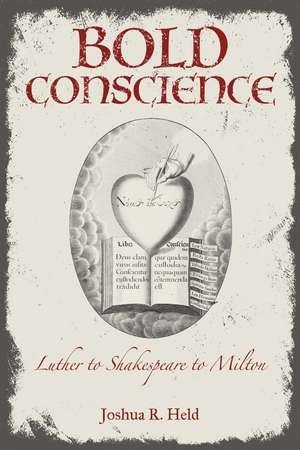Bold Conscience: Luther to Shakespeare to Milton: Strode Studies in Early Modern Literature and Culture
Autor Joshua R. Helden Limba Engleză Paperback – 13 iun 2023
Bold Conscience chronicles the shifting conception of conscience in early modern England, as it evolved from a faculty of restraint—what Shakespeare labels “coward conscience”—to one of bold and forthright self-assertion. The concept of conscience played an important role in post-Reformation England, from clerical leaders to laymen, not least because of its central place in determining loyalties during the English Civil War and the regicide of King Charles I. Yet the most complex and lasting perspectives on conscience emerged from deliberately literary voices—William Shakespeare, John Donne, and John Milton.
Joshua Held argues that literary texts by these authors transform the idea of conscience as a private, shameful state to one of boldness fit for navigating both royal power and common dissent in the public realm. Held tracks the increasing political power of conscience from Shakespeare’s Hamlet and Henry VIII to Donne’s court sermons and Milton’s Areopagitica, showing finally that in Paradise Lost, Milton roots boldness in the inner paradise of a pure, common conscience.
Applying a fine-grain analysis to literary England from about 1601 to 1667, this study also looks back to the 1520s, to Luther’s theological foundations of the concept, and forward to 1689, to Locke’s transformation of the idea alongside the term “consciousness.” Ultimately, Held’s study shows how conscience emerges at once as a bulwark against absolute sovereignty and as a stronghold of personal certainty.
Din seria Strode Studies in Early Modern Literature and Culture
-
 Preț: 252.13 lei
Preț: 252.13 lei -
 Preț: 448.28 lei
Preț: 448.28 lei -
 Preț: 246.53 lei
Preț: 246.53 lei - 18%
 Preț: 662.25 lei
Preț: 662.25 lei -
 Preț: 249.04 lei
Preț: 249.04 lei -
 Preț: 285.03 lei
Preț: 285.03 lei
Preț: 245.39 lei
Nou
Puncte Express: 368
Preț estimativ în valută:
46.96€ • 50.99$ • 39.45£
46.96€ • 50.99$ • 39.45£
Carte indisponibilă temporar
Doresc să fiu notificat când acest titlu va fi disponibil:
Se trimite...
Preluare comenzi: 021 569.72.76
Specificații
ISBN-13: 9780817361112
ISBN-10: 0817361111
Pagini: 248
Dimensiuni: 152 x 229 x 20 mm
Greutate: 0.31 kg
Editura: University Of Alabama Press
Colecția University Alabama Press
Seria Strode Studies in Early Modern Literature and Culture
ISBN-10: 0817361111
Pagini: 248
Dimensiuni: 152 x 229 x 20 mm
Greutate: 0.31 kg
Editura: University Of Alabama Press
Colecția University Alabama Press
Seria Strode Studies in Early Modern Literature and Culture
Notă biografică
Joshua R. Held is assistant professor of English at Southeastern Oklahoma State University. His scholarship has appeared in Studies in Philology, Modern Philology, Milton Studies, and Shakespeare Survey.
Recenzii
“This learned, agile book tracks pivotal changes in views of conscience from Luther through Locke. Offering nuanced readings of works by Shakespeare, Donne, and Milton, Held demonstrates the emergence of the idea of the bold conscience as a site of political resistance and as the locus of a dawning toleration.”
—Michael Schoenfeldt, editor of John Donne in Context
“[Held's] ambitions are grand, and call for facility in a wide range of contexts, literary and historical alike. To his great credit, Held shows that he is more than equal to the task. Bold Conscience is the work of a very capable, confident scholar with a particular talent for bringing divergent authors into conversation with each other. It will surely earn a place of prestige amongst the growing body of work on conscience in the period."
—Reformation
"Bold Conscience is distinguished not only by its learning, desire for rigour, and clarity of exposition but also by the imaginative way it establishes a series of surprisingly effective intertextual, print-enabled patterns. . . It is consistently intelligent and, most importantly, it brings the problem of conscience back to the centre of our attempts to understand the invention of modern individualism."
—Renaissance and Reformation / Renaissance et Réforme
—Michael Schoenfeldt, editor of John Donne in Context
“[Held's] ambitions are grand, and call for facility in a wide range of contexts, literary and historical alike. To his great credit, Held shows that he is more than equal to the task. Bold Conscience is the work of a very capable, confident scholar with a particular talent for bringing divergent authors into conversation with each other. It will surely earn a place of prestige amongst the growing body of work on conscience in the period."
—Reformation
"Bold Conscience is distinguished not only by its learning, desire for rigour, and clarity of exposition but also by the imaginative way it establishes a series of surprisingly effective intertextual, print-enabled patterns. . . It is consistently intelligent and, most importantly, it brings the problem of conscience back to the centre of our attempts to understand the invention of modern individualism."
—Renaissance and Reformation / Renaissance et Réforme
Descriere
How the conscience in early modern England emerged as a fulcrum for public action
